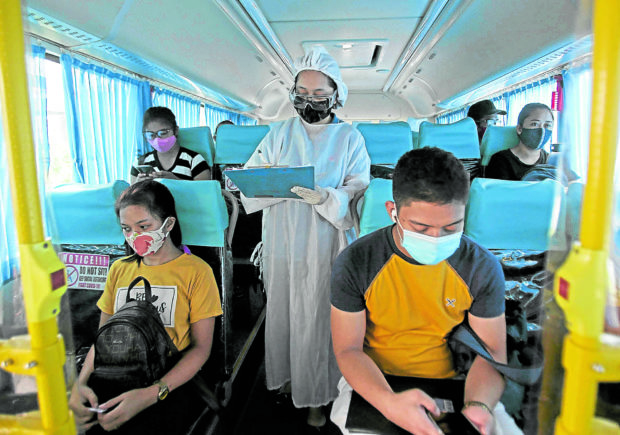DILG chief favors more PUVs over eased physical distancing rules
MANILA, Philippines — Interior Secretary Eduardo Año favors the deployment of more public utility vehicles (PUVs) rather than reducing the physical distancing measures amid the coronavirus disease 2019 (COVID-19) pandemic.
Año, vice chairman of the National Task Force against COVID-19, said he personally wants to abide by the one meter physical distancing for public transport to prevent the further spread of COVID-19.
“Personally, I would like to abide by the one meter minimum standard of physical distancing. If we can actually provide more transport to our people rather than reducing the distancing, that would be better,” he said in an interview on ABS-CBN News Channel Monday morning.
Earlier, Transportation Secretary Arthur Tugade announced that the Inter-Agency Task Force on Emerging Infectious Diseases and the NTF has approved the proposal to reduce the physical distancing in PUVs from one meter to 0.75 meter starting this Monday.
On September 11, Tugade said the government also plans to further ease the physical distancing limit to 0.5 meter after two weeks, then to 0.3 meters after another two weeks.
But when asked if he thinks this new adjustment may complicate the contact tracing efforts of the government, Año, who himself was a survivor of COVID-19 twice, replied: “That’s a possibility.”
He added that the government will continue to discuss the relaxation of physical distancing measures in public transport.
“We are going to discuss that further tomorrow. The resolution has been approved by the IATF but again as I have said, that is subject to discussion further especially that the health sector will present the argument tomorrow to reconsider the physical distancing reduction,” he said, referring to a meeting of the IATF on Tuesday.
Año explained that the government approved the adjustments following a clamor from the economic sector that the previous physical distancing requirements were not enough to ferry workers and commuters, thus adversely affecting the economy.
He noted that other government agencies also proposed additional measures to be observed in PUVs with this easing of protocols.
“They proposed additional measures like wearing face masks and of course face shields, and then absolutely no talking during the trip, no answering of phone,” he said.
“At the same time the NTF is also proposing that the vehicles for the public transport must also install some sort of barriers in between passengers,” the DILG chief added.
Año said the government will likewise monitor the effects of the relaxation of physical distancing requirements in PUVs and the COVID-19 situation in the country.
“There will be marshals in public transportation and we will review and monitor and we will check what is really the effect of this reduction in distance. This is still subject to changes if there are adverse effects of this reduction in distance,” he said.
gsg
For more news about the novel coronavirus click here.
What you need to know about Coronavirus.
For more information on COVID-19, call the DOH Hotline: (02) 86517800 local 1149/1150.
The Inquirer Foundation supports our healthcare frontliners and is still accepting cash donations to be deposited at Banco de Oro (BDO) current account #007960018860 or donate through PayMaya using this link.
